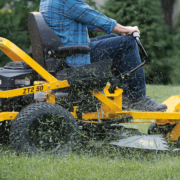During the peak of summer your lawn may suffer from stress from the heat and dry weather. There are a few tips and tricks one should follow in order to maintain a healthy lawn in extreme heat:
REFRAIN FROM CUTTING TOO SHORT
This is crucial for maintaining lawn health from the stress of summer. Turfgrass does better in the high heat of summer if you allow it to grown out a bit. By allowing your lawn to grow out a little you are promoting deeper grass roots that can suck up moisture and shade the soil which minimizes evaporation. If you cut your lawn too short you are reducing grass’s ability to produce the energy needed for growth.
- TIP: For mowing in the heat of summer, follow the one-third rule but let your grass grow roughly .5 of an inch higher than the recommended cutting height. Never remove more than one-third of your grass height at one time because this will lead to more stress, potential scalping of the lawn and/or disease. Research the type of grass in your region to help determine when to mow your summer stressed lawn.
- Reminder: allow roughly .5 of an inch more growth to the section for proper mowing techniques for summer stressed lawns. Example: Kentucky Bluegrass max height before mowing is 3¾ inches, allow it to grow to 4-4¼ inches before mowing
KEEP BLADES SHARP
This cannot be emphasized enough for a stressed or healthy lawn. Sharp mower blades create a clean cut which allows the plant to heal faster, unlike dull blades, that actually tear the plant’s tissue causing the tips to turn brown. This makes your lawn more susceptible to stress and disease. In the heat of summer, the last thing you want to be doing is compromising your lawn’s health with dull mower blades.
LEAVE CLIPPINGS
Clipping are beneficial to your lawn’s health, especially on a stressed lawn because the clippings act as slow-release fertilizers that put nutrients back into your lawn. Aim the clippings towards your lawn and not towards bodies of water, storm drains or streets.
WHEN IN DROUGHT, GROW IT OUT!
If you’re experiencing a drought in your area, you should avoid mowing. Lawns under stress from drought have limited ability to recover from mowing. This can actually damage your lawn more. Try mowing after you water or a rainfall.
- NOTE: In order to avoid clumping and clogging your mower deck, don’t mow damp grass. Allow the plants to dry a little before you mow.

